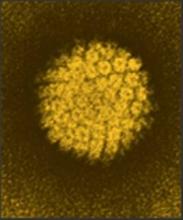ATLANTA – Initiation and completion of the human papillomavirus quadrivalent vaccination series is very low among active servicewomen in the United States Armed Forces, according to findings from the Defense Medical Surveillance System.
The findings are concerning, because HPV is the most common sexually transmitted infection among U.S. service members, Dr. Hala Nsouli-Maktabi reported in a poster at the International Conference on Emerging Infectious Diseases.
Of 270,257 active servicewoman who were eligible for vaccination between January, 2006 and June, 2011, only 60,807 (22.5%) initiated the vaccination series, receiving at least one of three doses. Of the 51,924 who remained active and eligible for vaccination at least 6 months after the initial dose, 31.8% received only the first dose, 22.7% received only two doses and 45.5% completed the series, said Dr. Nsouli-Maktabi of the Henry M. Jackson Foundation, Bethesda, Md.
Of those who did not complete the series by 6 months, 47,250 (16.8%) did complete it at 1 year. Those most likely to complete the series, either at 6 months or at 1 year, included Hispanics, blacks, never-married women, officers, younger women, women with higher education, and women with fewer sexually transmitted infections, she noted.
"Consistent with the Centers for Disease Control and Prevention’s Advisory Committee on Immunization Practices recommendations, the Department of Defense recommends routine HPV vaccination of eligible service members aged 17-26 years with the three-dose series administered over 6 months," Dr. Nsouli-Maktabi wrote.
This study was undertaken in response to anecdotal reports that vaccination remained low despite the availability of HPV4 vaccine, and the findings confirm these reports, she said, concluding that the findings indicate a need for increased education of servicewomen and providers about the benefits of vaccination.
Such education may increase HPV4 coverage and enhance series completion, she concluded.


